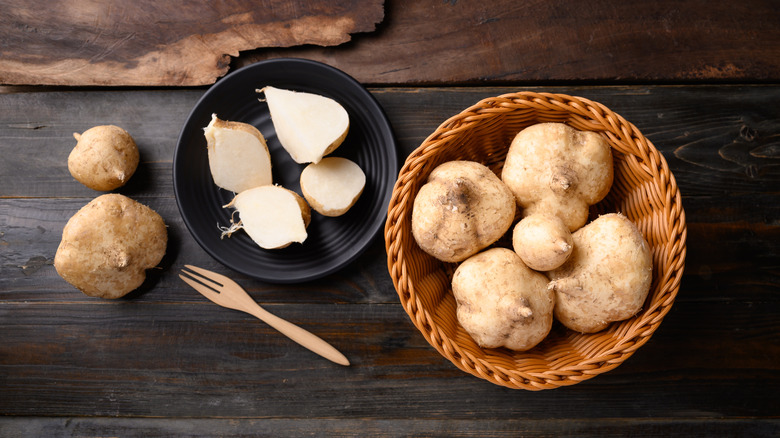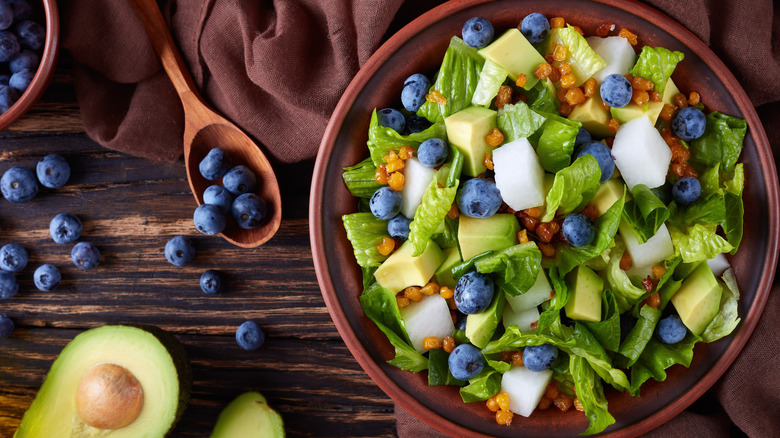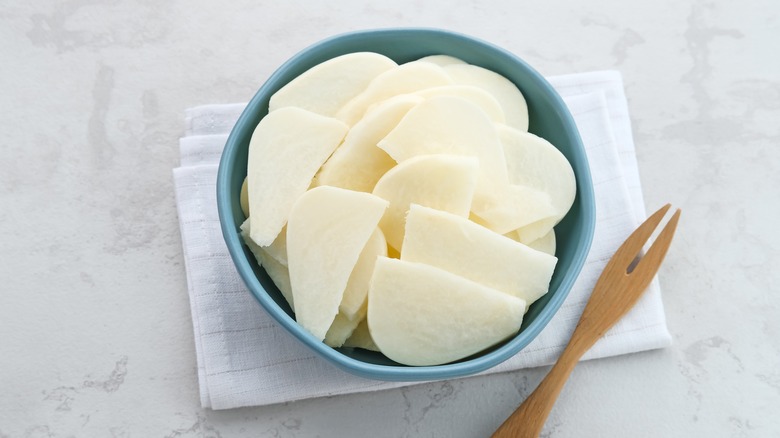What Are The Health Benefits Of Jicama?
Have you heard of jicama? It's a relative of the potato, with a round shape and starch-filled center (via Healthline). Jicama is a root vegetable that's so much more than just another starch. It's rich in vitamins, it can provide hydration, and it can decrease your risk of several conditions, including some cancers. If you could blend a potato and a superfood, the result would likely be jicama.
Jicama thrives in warm environments, and it has since spread from its native Mexico to the Philippines and several places in Asia. Because of its widespread use, jicama is also referred to as the Mexican water chestnut, the Mexican potato, and the Chinese turnip. Unlike potatoes, jicama has a sweeter, nuttier flavor. The taste and texture of jicama are sometimes described as a blend between a pear and potato.
Jicama can be consumed raw as slices similar to carrot sticks, but it's also popular in slaws and stir-fries. You can get creative in the kitchen with this nutrient-dense vegetable while absorbing all of its benefits. A quick note of caution that only jicama's inner white flesh is safe to eat, per WebMD. The skin of jicama, along with the plant's seeds, leaves, and stem, is poisonous. The stems and seeds contain rotenone, which has insecticide properties. These can create free radicals and cause DNA damage if consumed by humans (per Livestrong). Rotenone can traverse cell membranes and the blood-brain barrier, so be careful to only consume the fleshy part of jicama.
Jicama provides a boost of nutrients
Jicama is packed with vitamins and nutrients. A medium-sized jicama contains an average of 32 grams of fiber, 4 grams of protein, and approximately 15% of the daily recommended amount of vitamin C for adults (per WebMD). For an added perk, a medium-sized jicama only has about 250 calories, making it a healthy snack that can also help with weight management. Jicama is an excellent source of vitamin C, which supports immunity, and vitamin B6, which provides the power your body needs to produce red blood cells, support your brain health, and make energy out of the protein you eat. This powerful veggie is also filled with antioxidants, which keep your cells from becoming damaged. And given that jicama is 85% water, it's an excellent source of hydration for your body.
Medical News Today reveals that jicama is rich in prebiotics, particularly inulin, which is a fiber that helps probiotics grow and thrive. Other vitamins and nutrients in jicama include calcium, vitamin E, pantothenic acid, riboflavin, thiamine, zinc, phosphorus, and copper (via Healthline). In addition to this dense list of benefits, eating jicama can also help you meet the daily recommended amounts of fiber, iron, potassium, and magnesium. In fact, a single cup's worth of jicama can provide up to 23% of the daily recommended amount of fiber for women and 17% of the daily recommended amount for men. Mix some jicama into a salad with other fruits and veggies, and you'll be a vitamin powerhouse!
Jicama helps with health management
If you experience health conditions like high cholesterol, weight management, or diabetes, jicama can be a great way to help you manage your health through diet (per WebMD). The antioxidants within jicama can assist in lowering your risk of serious conditions such as heart disease, cognitive decline, and cancer. For people who keep an eye on their insulin and blood sugar levels, eating jicama can be a good option because it has a low glycemic load. Given that added sugars are often found in modern food, eating plant-based items like jicama (that don't have a large impact on blood sugar) can be beneficial in both weight management and maintaining steady energy.
The soluble dietary fiber found in jicama can decrease cholesterol levels, reports Healthline. This process is two-fold. The fiber in jicama stops the liver from producing additional cholesterol and helps bile move through the intestines without becoming reabsorbed. Fiber can also help you feel full longer and assist with maintaining normal bowel movements, eliminating constipation. From the high amounts of vitamins and nutrients to alleviating serious health conditions, jicama has benefits for everyone.
If you want to add jicama to your diet or just try it in a recipe, it's usually sold year-round in most supermarkets (per Cooking Light). When purchasing jicama, you want the vegetable to be dry and firm, and the skin should be free from blemishes, bruises, and wrinkles.



